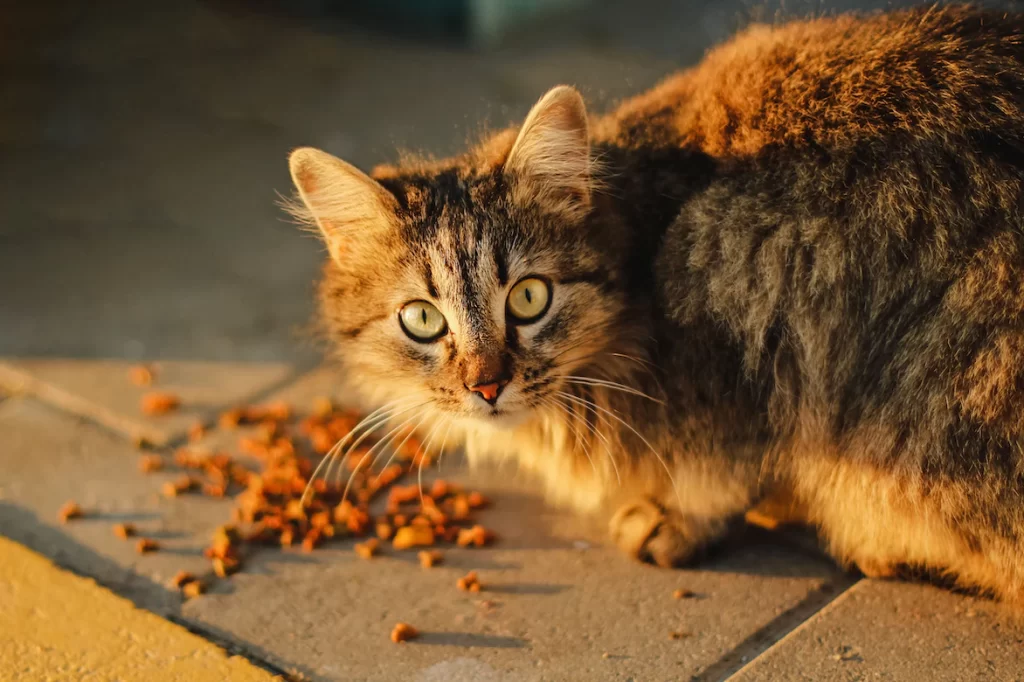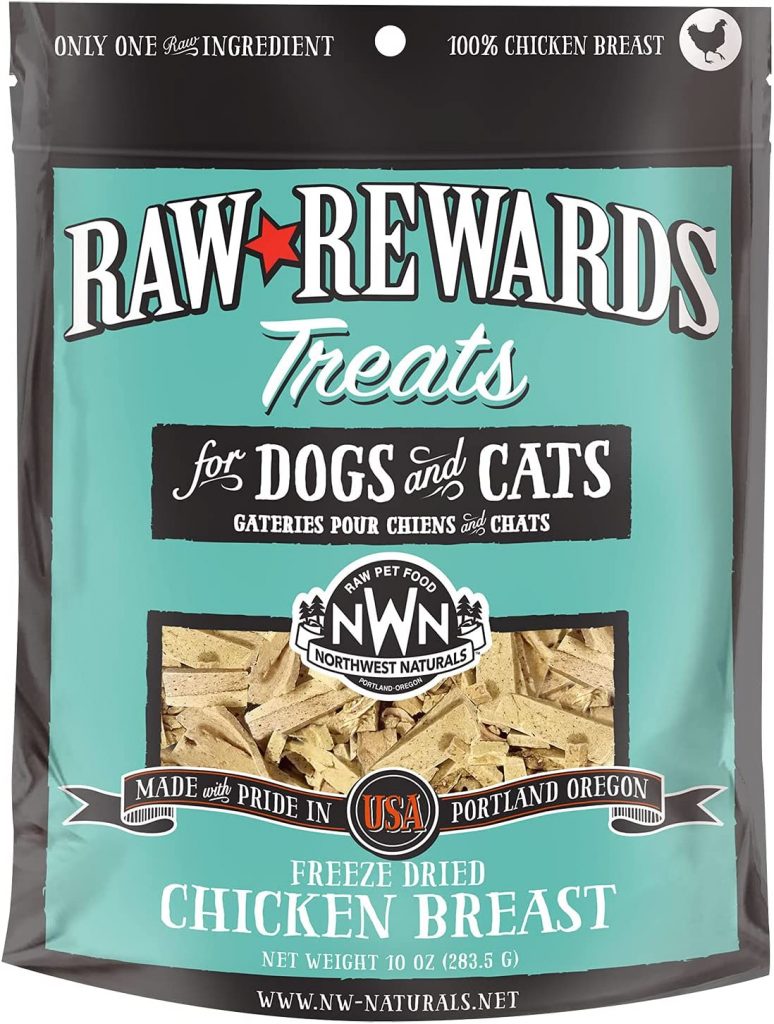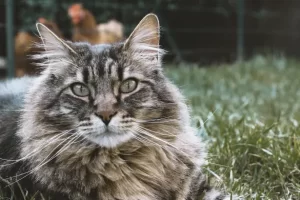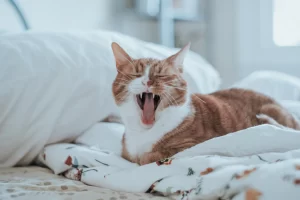Last updated on February 6th, 2023 at 03:43 am

If you share your home with both a dog and a cat, you may occasionally find yourself wondering if cats can eat dog treats. You wouldn’t want your cat to feel left out just because you’re feeding the dog a wonderful treat, and you might notice that your cat is looking at you wistfully whenever you do so. The short answer is yes. However, not all dog treats are safe for your cats. We will explain that further in this article.
Dogs can choose from a wide variety of treats on the market today, including chews, sticks, pastes, and biscuits. Is it preferable to stick with cat treats, or are there certain dog treat varieties that your feline friend can also love?
If you stay to the end of the article, we also review a great treats product for both dogs and cats so that you don’t have to worry about if the treats are harmful to cats

Northwest Naturals Raw Rewards Freeze-Dried Treats for Dogs and Cats
Can Cats Eat Treats Meant for Dogs?
Yes, cats are allowed to eat dog treats so long as they contain meat and are not given out on a regular basis. However, you should always make an informed decision before feeding a treat intended for dogs to your cat because not all dog treats are suitable for feline consumption.
Although cats do not have the same fundamental requirement for treats as dogs do, giving them treats on occasion is beneficial for training, reinforcing appropriate behavior, promoting dental health, and supplementing the diet.
What Are the Differences Between Cat and Dog Treats?
Before you let your cats eat any dog treats, let us distinguish between cat and dog treats in order to better understand why dog treats are not always appropriate for cats. While cats are carnivores and require a meat-based diet, dogs are omnivores and may consume grains, vegetables, and fruits to some level for energy. This means that, while dogs should consume primarily meat, their diet may also include other foods. Cats, on the other hand, should consume nothing but meat.
Although these are commonly acknowledged truths about cat and dog nutrition, dog and cat food can be extremely similar in terms of substance. Although cats are obligate carnivores, the pet food industry produces cat meals that include grains, soy, and vegetables to reduce costs. The same is true for dog treats.
Most cat owners are aware that dog food should not be fed to cats since it contains more grains and soy and less meat. As a result, dog food lacks many of the vital elements that cats require and can only be obtained through the meat.
These are some examples:
- Taurine.
- Arginine.
- Niacin (vitamin B3).
- Pyridoxine (vitamin B6).
- Thiamine (vitamin B1).
Your cat will get quite unwell if it does not get these vitamins and amino acids, thus it must consume enough meat every day. This means that cat snacks should ideally be produced from meat. Dog treats, on the other hand, frequently contain a variety of different substances, including wheat.
This isn’t to imply that cat treats aren’t good. Unfortunately, many cat treats are either not made of meat or include only a small amount of it. This is perfectly acceptable as long as the treats account for no more than 10% of your cat’s daily food intake. Treats should never be used in place of high-quality cat food to provide a balanced diet and keep your kitten healthy.
This also does not imply that all of the non-meat elements in dog treats are harmful to your cat. Although they may not be a regular part of a cat’s diet, extremely nutritional items such as fruits may help your cat. Finally, the nutritional value of many cat and dog treats is fairly comparable. The key thing is that they are fed in tiny amounts in conjunction with a balanced diet, and that their safety is always prioritized.
So, how can you tell if a dog treat is safe for cats? Let us investigate.
How to Choose a Dog Treat for Your Cat? And What Ingredients to Avoid?
Dog snacks are not suitable for cats because they typically contain components other than meat. However, most cat treats are not made entirely of meat, thus the difference is negligible in practice. It is acceptable to give your cat or dog treats on occasion and in small quantities. Some dog treats are acceptable to cats, while others are not. It all boils down to the contents of the snacks.
A dog treat is unlikely to hurt your cat, but offering dog treats on a regular basis will fill your cat’s tummy and cause them to lose interest in its meal. Make sure that the treat is made of meat and that it doesn’t contain any harmful ingredients.
Treats, whether cat or dog treats, should never account for more than 10% of your cat’s daily meal intake. You don’t need to be concerned about nutrition if you let your cats eat dog treats on occasion and your cats consume a balanced diet otherwise. If you are a bit curious and really wanted to let your cats eat your dog treats, take note of these ingredients to avoid.
Four ingredients to avoid
Four ingredients are not suitable for your cat, and you should always double-check that they are not stated on the dog treats you intend to give to your feline:
- Garlic, fresh or powdered (flavoring).
- Onion powder or onion extract (flavoring).
- Glycol propylene (moisture retaining agent).
- Polyethene glycol (moisture retaining agent).
Cats are extremely sensitive to the allium family’s garlic, onion, leeks, and chives. These foods contain n-propyl disulfide, which damages red blood cells through oxidative stress.
A small amount of garlic powder or onion extract in a single dog treat may not pose any issues for your cat but consuming them on a daily basis may induce anemia.
Propylene glycol and ethylene glycol, on the other hand, are preservatives found in dog treats that can be toxic to cats.
All four of these components cause oxidative alterations in hemoglobin, which transports oxygen inside red blood cells. As a result, ingesting them may cause your cat to have anemia symptoms such as:
- Gums that are pale.
- Enhanced respiratory rate.
- Weakness.
- Appetite suppression.
If your cat consumes a dog treat containing some of these ingredients, he or she should be alright. Even a weekly treat may not be harmful. Even still, it’s best to avoid them if possible because there is no safe limit.
Other Often Discussed Substances
Aside from the ingredients in dog treats that can seriously injure your cat, there are a few more that are frequently discussed yet do not endanger cats.
- Glycerin/Glycerol – Only poisonous to cats in large concentrations.
- Butylated hydroxyanisole (BHA) and butylated hydroxytoluene (BHT) are preservatives that have been shown in studies to be safe when used in modest amounts in foods. Although it is best to avoid these chemicals, they are not dangerous to cats in tiny amounts.
- Rosemary extract is a natural preservative that has long been suspected of causing seizures and neurological issues in cats. Cats, however, are sensitive to rosemary essential oil, not rosemary extract.
It is usually safe to let your cats eat dog treats sometimes if there is no caution sign on the container. However, if you are doubtful, it is best to contact your veterinarian to be on the safe side.
Can cats consume dog chews?
Dog chews, such as antlers, bones, rawhide, and nylabones, are not appropriate treats for your cat. In any case, your cat is unlikely to be interested in a dog chew! However, if they did, it may injure their teeth and mouth or possibly become lodged in their esophagus.
Can cats consume dog jerky?
Dog jerky treats are better alternative for your cat than dog chews. This is due to their softer texture, which makes them less prone to shatter your cat’s teeth. Most jerky treats do not include any hazardous preservatives or flavorings, but it’s always a good idea to double-check.
However, the tough quality of jerky may pose a choking threat for your cat, so keep a watch on them if you decide to give them a jerky treat. But keep in mind that there are many of healthy cat treats on the market, so the risk of giving your cat a dog jerky treat may not be worth it.
Can cats consume soft dog and biscuit treats?
Soft and biscuit treats may also be suitable for your cat if they do not include any hazardous chemicals. Check the ingredients list for these types of treats because the softer texture is frequently caused by increased moisture, which could signify the use of propylene glycol.
What if my cat consumes dog treats?
Most dog treats are unlikely to damage your cat, especially if they consume only a tiny amount. However, because the treats are intended for canines, they cannot be guaranteed to be safe for cats.
Check the contents list if your cat ate a dog treat to see if there are any potentially harmful substances. It’s also a good idea to save the package in case you need to present it to your veterinarian. You should keep an eye on your cat as long as he or she appears healthy and shows no signs. However, if they become ill or you have any concerns, contact your veterinarian.
Are there chew bones available for cats?
There are a few chews for cats available, but no safe chew bones for cats. Chew toys may be a safer option if you want to encourage your cat to chew to maintain their teeth healthy or to keep them amused while you’re away.
A Short Review: Northwest Naturals Raw Rewards Freeze-Dried Treats for Dogs and Cats

Cats do not require treats and do not rely on them as heavily as dogs do. If you want to give your cat treats, either to train them or to reward them a little, stick to specific cat snacks. To keep them from acquiring too much weight, you may even give them dry food as a reward. If you do decide to give them a dog treat now and again, make sure you verify the contents first so your feline buddy can enjoy them without anxiety! One of the treats created for both cats and dogs is the Northwest Naturals Raw Rewards Freeze-Dried Treats for Dogs and Cats.
It is a frozen raw food treat that contains only one ingredient which is the flavor itself. If you buy the chicken flavor, the only ingredient is chicken. Same with fish and other meat ingredients. Your cats can enjoy this treat as it is made of meat. If you are having doubts about it, you can check with your vet before introducing any new treats to your feline.
Why Should I Give My Cat Cat Treats?
Cat snacks are created with your cat’s special needs in mind. This implies that
- The nutritional composition of cat treats is ideal for cats and takes their dietary requirements into account.
- Many cat treats are made to improve your cat’s health and oral hygiene.
- Cat treats are the proper size for your cat to avoid choking or gastrointestinal obstruction.
- Cat snacks are made using ingredients that cats enjoy.
Conclusion
Some dog treats are acceptable to cats, while others are not. It all boils down to the contents of the snacks. Some elements in dog biscuits may be harmful to cats’ health. Onion, garlic, ethylene glycol, and propylene glycol are examples.
However, a single treat is unlikely to be harmful. Even one treat each week may be acceptable, but it is always better to be safe and avoid these potentially hazardous chemicals entirely.
Although some dog treats may be OK for your cat, we recommend sticking to cat treats because you can be sure they are safe and designed with their requirements in mind.
Also read:


